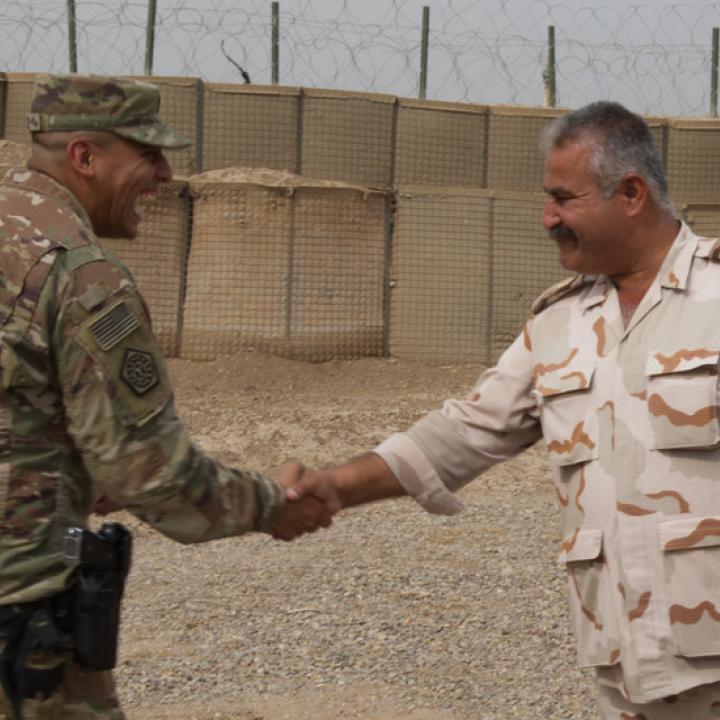
- Policy Analysis
- Fikra Forum
How Iraq and the United States Can Further the Strategic Dialogue

The United States and Iraq officially launched the bilateral strategic dialogue on June 11 as an opportunity to mend relations under the newly formed Iraqi government. While Iranian backed forces hoped for the initial meeting to produce dramatic results vis-a-vis the future of U.S. presence in the region, the first round of talks instead focused on the diplomatic protocols necessary to lay the groundwork for forthcoming negotiations. Establishing a foundation is a necessary first step, but if both sides intend for the dialogue to be successful, each must adjust its attitudes towards the other. In particular, it remains to be seen whether the United States will be able to initiate mutual agreements and collaborative projects from this theoretical framework.
The joint statement issued at the end of the first session included a section about U.S. intent to “continue reducing forces”—worded in such a way as to mollify Iranian backed groups inside of Iraq while remaining noncommittal. This phrasing reflected the contentious nature of the dialogue, as pro-Iranian actors mounted a media driven, counter campaign in the days before the dialogue objecting to its nature and agenda. They demanded that the first round of talks include a clause on the removal of foreign troops from Iraq, and the undramatic contents of the initial statement suggested that their media campaign was ineffective.
While armed Iranian factions are dissatisfied with the results of the first round of talks, it is unlikely that they will be able to escalate the situation in Iraq, though the recent arrests of Kata’ib Hezbollah figures suggests an attempt to do so. In fact, evidence points towards a decline in their ability to do so given that they no longer have the political cover that they enjoyed under the government of Adil Abdul-Mahdi. The Fatah Alliance, which is comprised of groups involved with the Popular Mobilization Forces and led by Hadi Al-Amiri, has begun to fracture as its current leadership continues to diverge from its original objectives. The tightening of U.S. sanctions has also weakened Iran's influence in the media space; its organizations, newspapers, and cultural centers have started to reduce staff and cut spending.
Yet while the inauguration of Mustafa Al-Kadhimi and popular frustration with Iran suggest that Iran’s grip on Iraq is weakening, the United States must not be too quick to declare the initial round of talks a “victory.” Historically, Iran does not surrender easily but rather adjusts its plans based on events and circumstance. Because the primary U.S. objective in Iraq is to neutralize Iran's spheres of influence, the Iraqi government’s abilities to affect U.S. policy comes primarily from its utility in countering the Iranian threat. The current Iraqi administration may consider this objective a vulnerability of the U.S. position and will most likely exploit it as a bargaining chip and pressure point.
As such, following the first U.S.-Iraq strategic dialogue session, there are a number of pertinent questions that remain. What has led the Iraqi government to take the risk of rejecting the Parliament's resolution to expel foreign troops from the country? Why does the Iraqi government risk angering a neighboring country with whom it shares a long border and is bound to politically, economically, and socially? And what drives it to risk confrontation with armed factions, which threaten to breach the civil peace?
U.S. diplomats must be able to answer these questions and understand the incentives they can provide Iraq if the strategic dialogue is to be successful. Currently, the United States lacks a well-defined, strategic plan in Iraq that would make it possible to build more productive talks in the future. Mixed messages from the United States about the presence of its troops in Iraq has left ordinary Iraqis frustrated. From the Iraqi perspective, their country is viewed by the United States as nothing more than a forward operating base to counter Iranian influence. During the most recent talks, the United States expressed interest in "helping Iraq deal with its crises... providing economic advisers," but Iraqis see this as merely diplomatic rhetoric. Moreover, the apparent U.S. willingness to consider withdrawing from Iraq gives the impression that it has little interest in the actual country and the wellbeing of the Iraqi people. As such, the United States must adopt a clearer policy towards Iraq with demonstrable follow-through if it wants Iraqis to help implement the U.S. objective of combating Iranian Influence.
With the exception of its role in the War on Terror, the United States has not carried out any major projects in Iraq during the past ten years. Prior to its 2011 troop withdrawal, the U.S. administration had developed a project to assist in the reconstruction of Iraq. This plan consisted of numerous small-scale investment projects—such as building sports stadiums, health clinics, and improving the water and sewage infrastructures in a number of Iraqi governorates—which have had a positive impact on many Iraqis. But this type of aid has not been visible to most Iraqis since the troop withdrawal almost ten years ago.
The joint statement issued after the first round of talks illustrated a good measure of the needed political pragmatism. However, it remains limited to a theoretical framework that has yet to be translated into well-defined plans and projects. To realize these objectives, the Iraqi government must understand that neutralizing Iran's influence in their country should not only be a U.S. goal but an Iraqi goal. Iraq must recognize that Iranian influence is behind a large share of its political, economic, and security-related problems. On the U.S. side, it must deliver a comprehensive plan that transforms the theoretical talk of "helping Iraq address its crises" into a tangible reality that can win over Iraqis and refute the arguments of political actors who oppose an Iraqi-partnership with the United States.

